
|

|


What is a NutriCircle?
|
Search for nutrient information |
|
Proteins
Combining plant sources, such as peanut butter with whole-grain bread or rice with beans, provides excellent protein. So does combining plant and animal sources such as cereal and milk or macaroni and cheese.
Carbohydrates
Carbohydrates are the body's main source of energy.
Sugars are not essential foods.
Fats and Oils Fats and oils (which are liquid fats) are a concentrated source of energy. Fats in the diet are necessary for good health. They make certain vitamins available for use in the body, they cushion vital organs, they make up part of all body cells, and they help to maintain body temperature. Fats also delay pangs of hunger, because a food mixture containing fat remains longer in the stomach. Two particular fats (polyunsaturated omega-3 and omega-6 types) are needed to build regulatory substances called prostaglandins.
Nutritionists distinguish between different types of dietary fats. Saturated fats usually are solid in form and of animal origin.
Minerals
Minerals are inorganic. Almost all whole foods contribute to an intake of various essential minerals. Some minerals are easy to obtain in quantities required by the body. A major exception is iron for children under age 4 and adolescent girls and women in the childbearing years. These groups need more iron than a normal diet may provide. Iron helps to build red blood cells. Everyone at every age needs calcium. This mineral helps build bones and teeth, and it is necessary for blood clotting. The best sources are milk and hard cheese. Others are leafy greens, nuts, and small fishes--such as sardines--with bones that can be eaten. Phosphorus works with calcium to make strong bones and teeth. A diet that furnishes enough protein and calcium also provides enough phosphorus. Other important minerals are sodium, potassium, iodine, magnesium, zinc, and copper.
Vitamins
Water
In order to live, every cell in the body must be bathed in water. |
[Home] [History] [Library] [Nutrients] [Resources] [Contact] [Contribute]
Back To Molecule

This website is managed by Riordan Clinic
A Non-profit 501(c)(3) Medical, Research and Educational Organization
3100 North Hillside Avenue, Wichita, KS 67219 USA
Phone: 316-682-3100; Fax: 316-682-5054
© (Riordan Clinic) 2004 - 2024c
Information on Orthomolecular.org is provided for educational purposes only. It is not intended as medical advice.
Consult your orthomolecular health care professional for individual guidance on specific health problems.
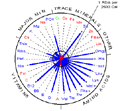
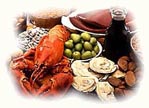 Proteins are made of amino acids, small units necessary for growth and tissue repair. Protein is the body's most plentiful substance except for water and, possibly, fat. Animal foods such as meat, fish, poultry, milk, and eggs are rich in protein. Good plant sources of protein are beans, peas, nuts, bread, and cereals.
Proteins are made of amino acids, small units necessary for growth and tissue repair. Protein is the body's most plentiful substance except for water and, possibly, fat. Animal foods such as meat, fish, poultry, milk, and eggs are rich in protein. Good plant sources of protein are beans, peas, nuts, bread, and cereals.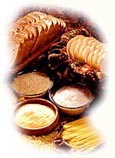
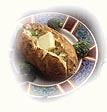 There are three different kinds of carbohydrates. They include starch, sugar, and fiber. Starch is made from chains of small sugars. When these chains are broken down during digestion, we get energy. We get 4 calories from each gram of starch (or sugar). We do not get calories from fiber because our bodies do not break fiber down during digestion.
There are three different kinds of carbohydrates. They include starch, sugar, and fiber. Starch is made from chains of small sugars. When these chains are broken down during digestion, we get energy. We get 4 calories from each gram of starch (or sugar). We do not get calories from fiber because our bodies do not break fiber down during digestion.
 Refined or purified sugars provide energy (calories) but no nutrients. For that reason sugar is called an "empty calorie" food. Occasional sweets are not harmful to a healthy, active person, but excessive sugar can lead to tooth decay when eaten between meals, especially in sticky snack foods that cling to the teeth.
Refined or purified sugars provide energy (calories) but no nutrients. For that reason sugar is called an "empty calorie" food. Occasional sweets are not harmful to a healthy, active person, but excessive sugar can lead to tooth decay when eaten between meals, especially in sticky snack foods that cling to the teeth.
 In many typical diets, meat fat is the main source. Saturated fats can raise the level of cholesterol in the blood. Cholesterol is a natural waxy substance made by the body. It helps to form digestive juices and does other important work. It is present in the body no matter what is eaten.
In many typical diets, meat fat is the main source. Saturated fats can raise the level of cholesterol in the blood. Cholesterol is a natural waxy substance made by the body. It helps to form digestive juices and does other important work. It is present in the body no matter what is eaten.
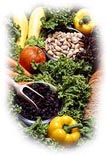 These cells help the blood carry oxygen from the lungs to each body cell. Rich sources of iron are meat, especially liver; egg yolks; and dark green vegetables.
These cells help the blood carry oxygen from the lungs to each body cell. Rich sources of iron are meat, especially liver; egg yolks; and dark green vegetables.
 All living things need vitamins for growth and health. The body either cannot manufacture them at all or cannot normally manufacture them in sufficient amounts, and so must absorb them from food. Each vitamin has specific roles to play. Many reactions in the body require several vitamins, and the lack or excess of any one can interfere with the function of another.
All living things need vitamins for growth and health. The body either cannot manufacture them at all or cannot normally manufacture them in sufficient amounts, and so must absorb them from food. Each vitamin has specific roles to play. Many reactions in the body require several vitamins, and the lack or excess of any one can interfere with the function of another.
 Water takes an active part in many chemical reactions and is needed to carry other nutrients, to regulate body temperature, and to help eliminate wastes. Water makes up about 60 percent of an adult's body weight. Requirements for water are met in many ways. Most fruits are more than 90 percent water.
Water takes an active part in many chemical reactions and is needed to carry other nutrients, to regulate body temperature, and to help eliminate wastes. Water makes up about 60 percent of an adult's body weight. Requirements for water are met in many ways. Most fruits are more than 90 percent water.